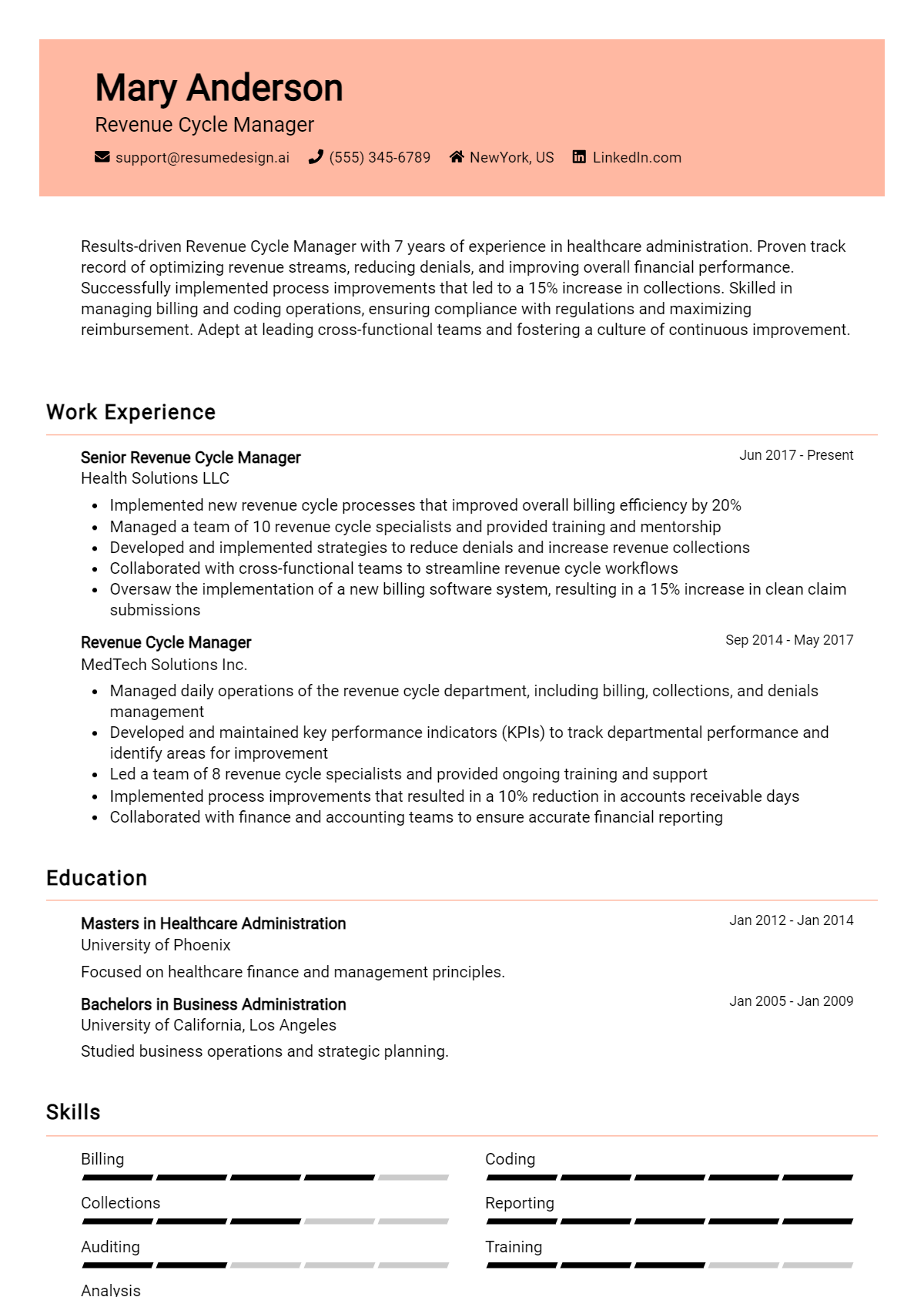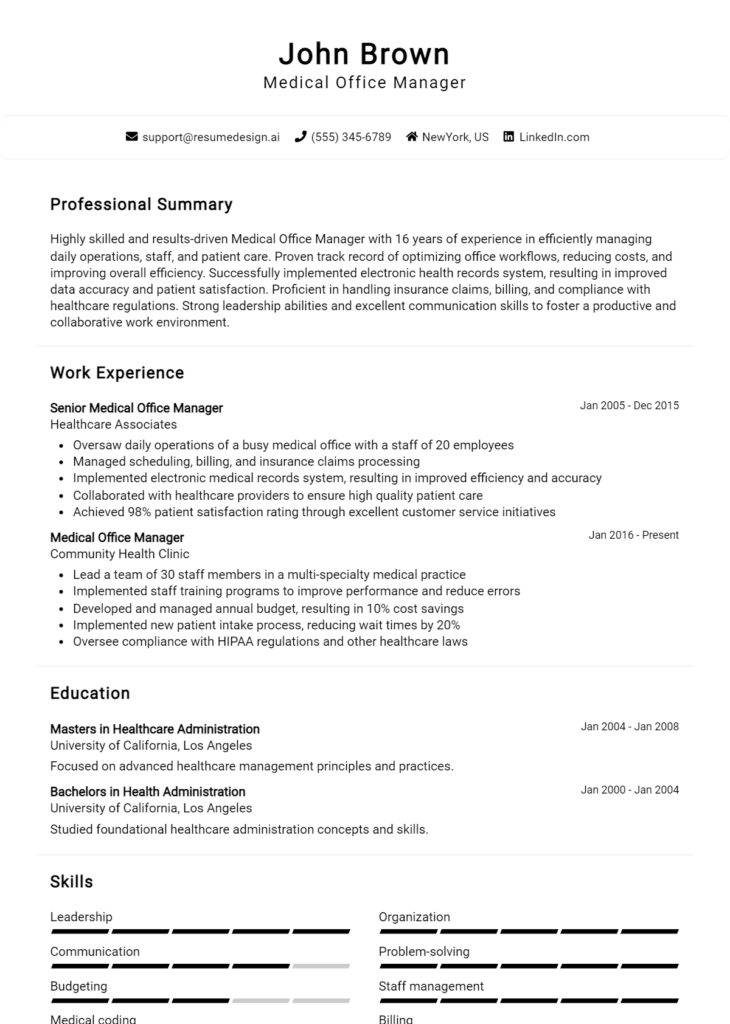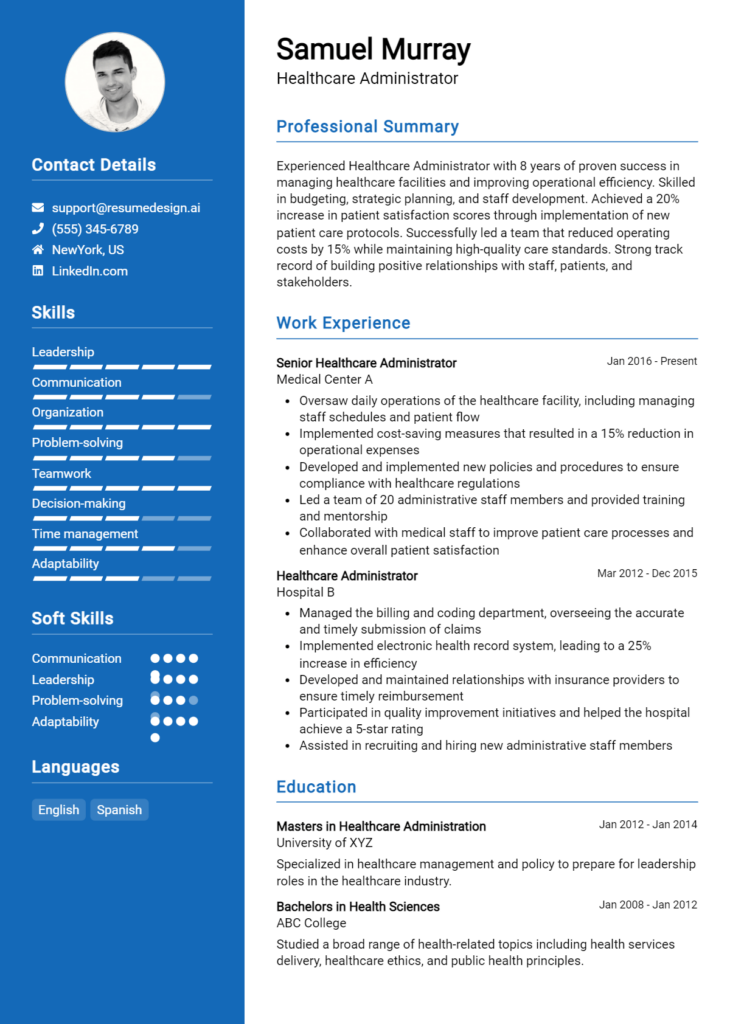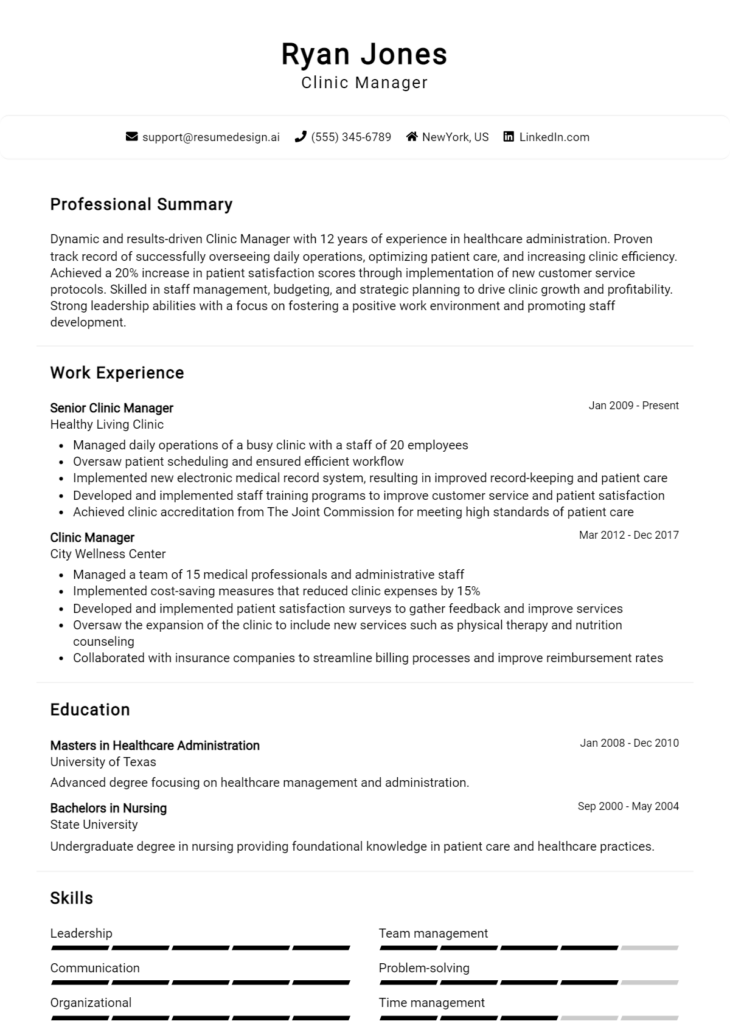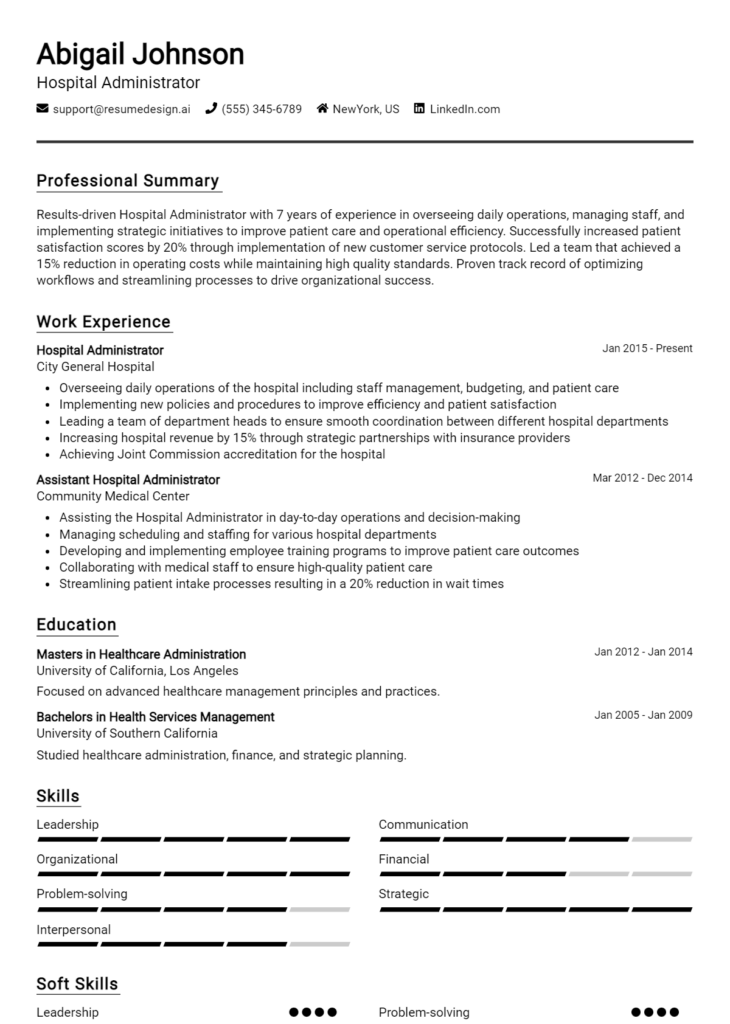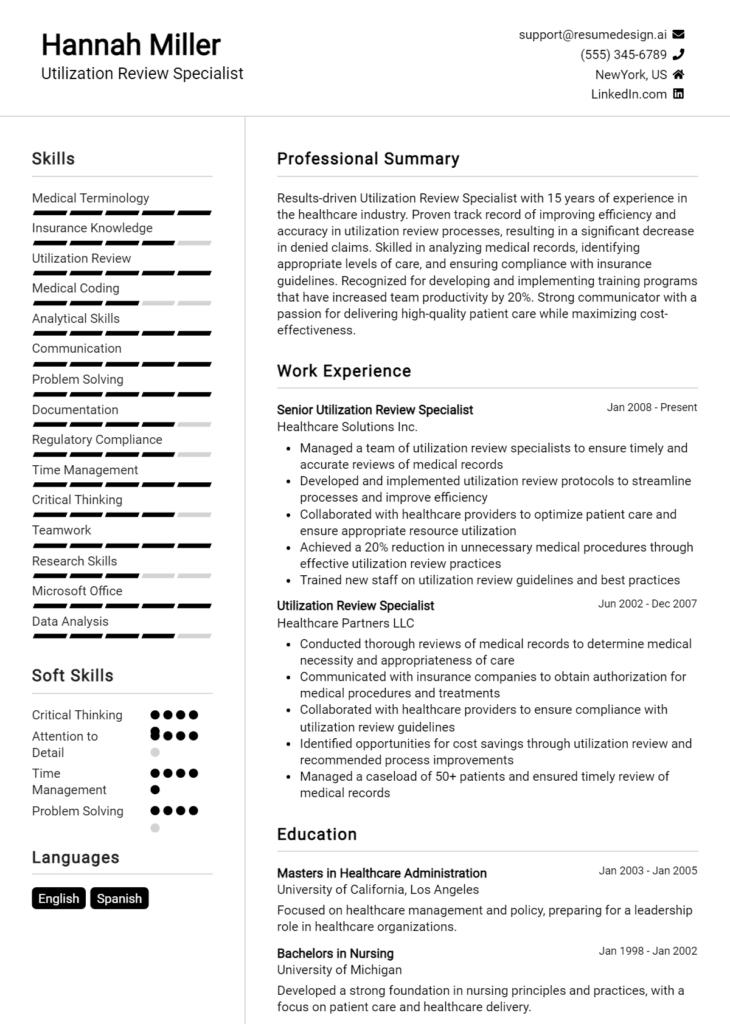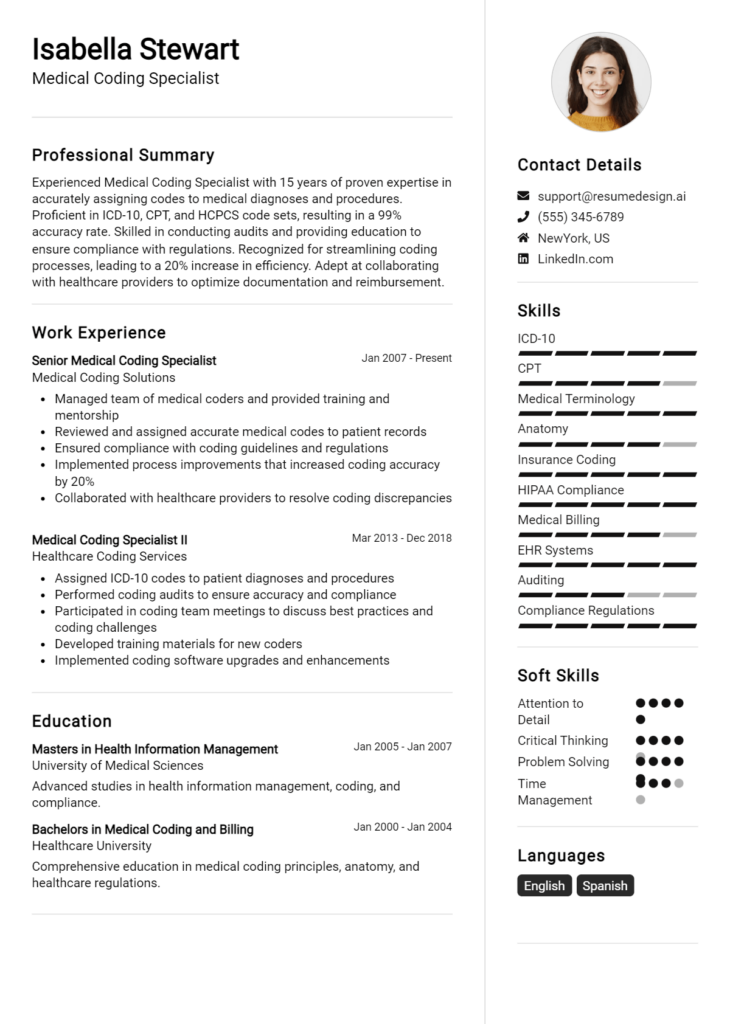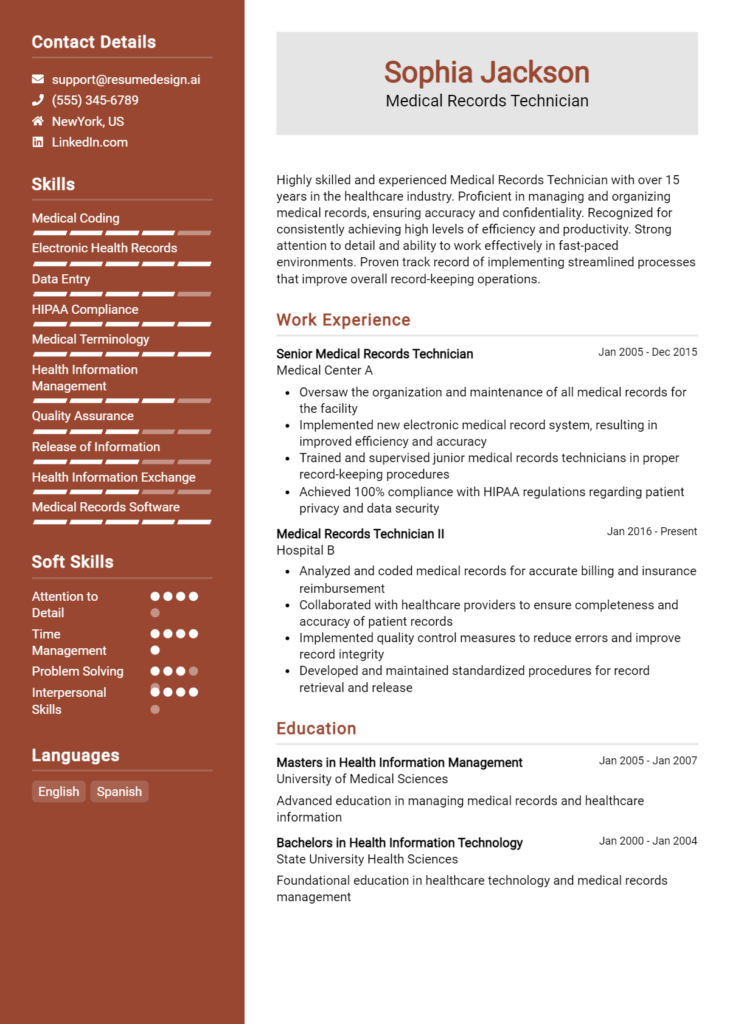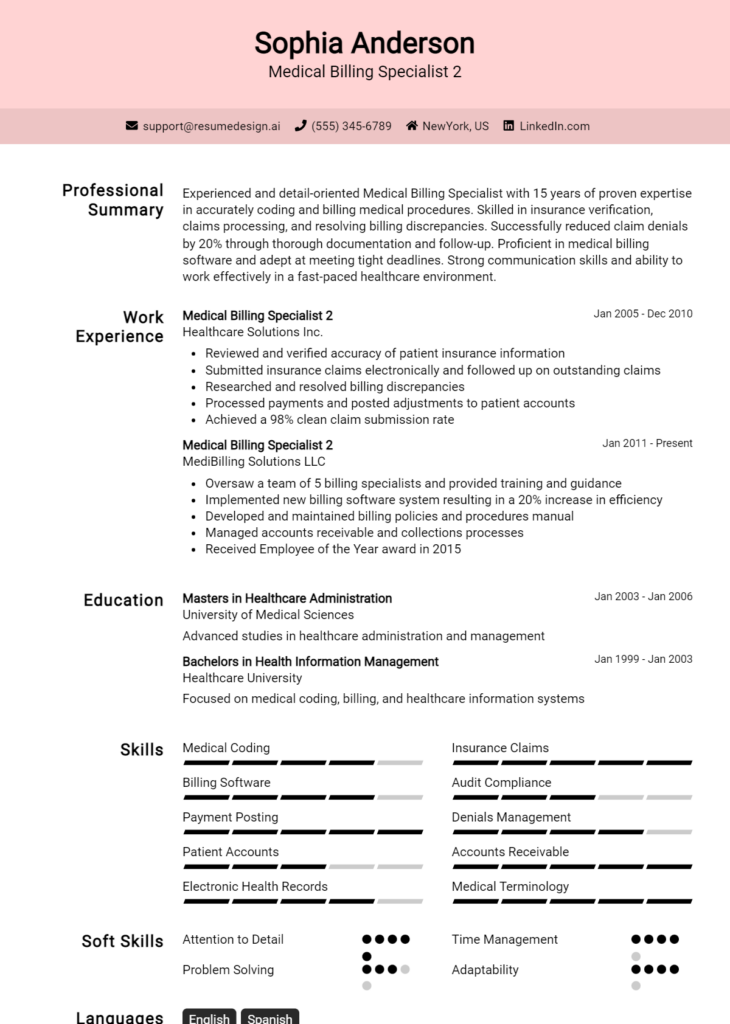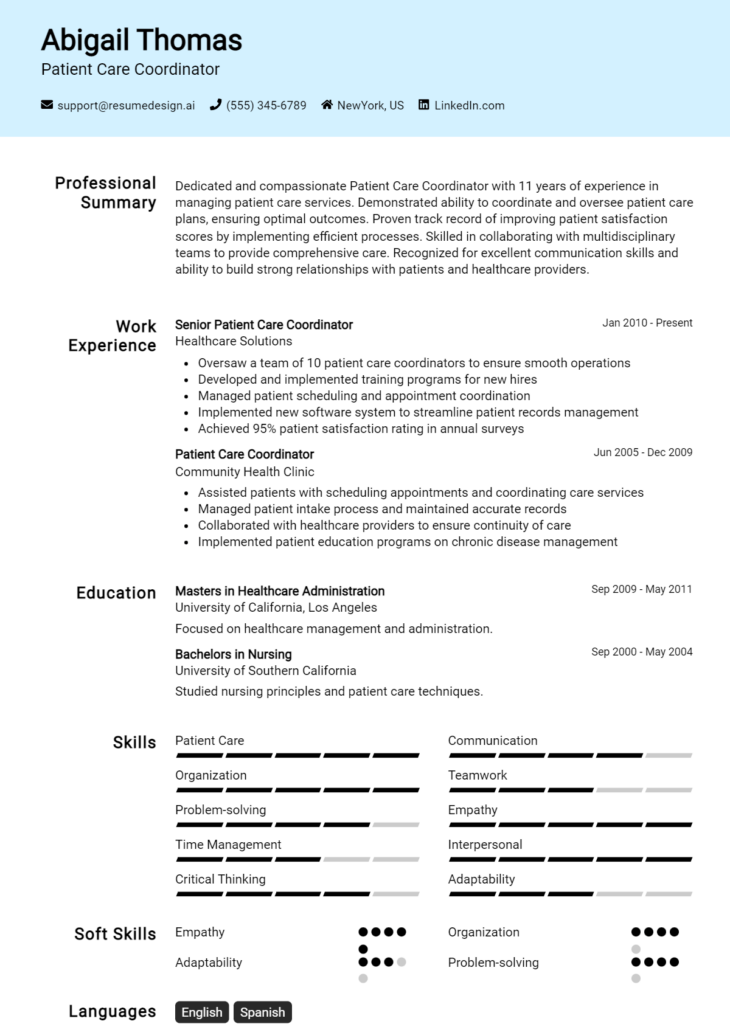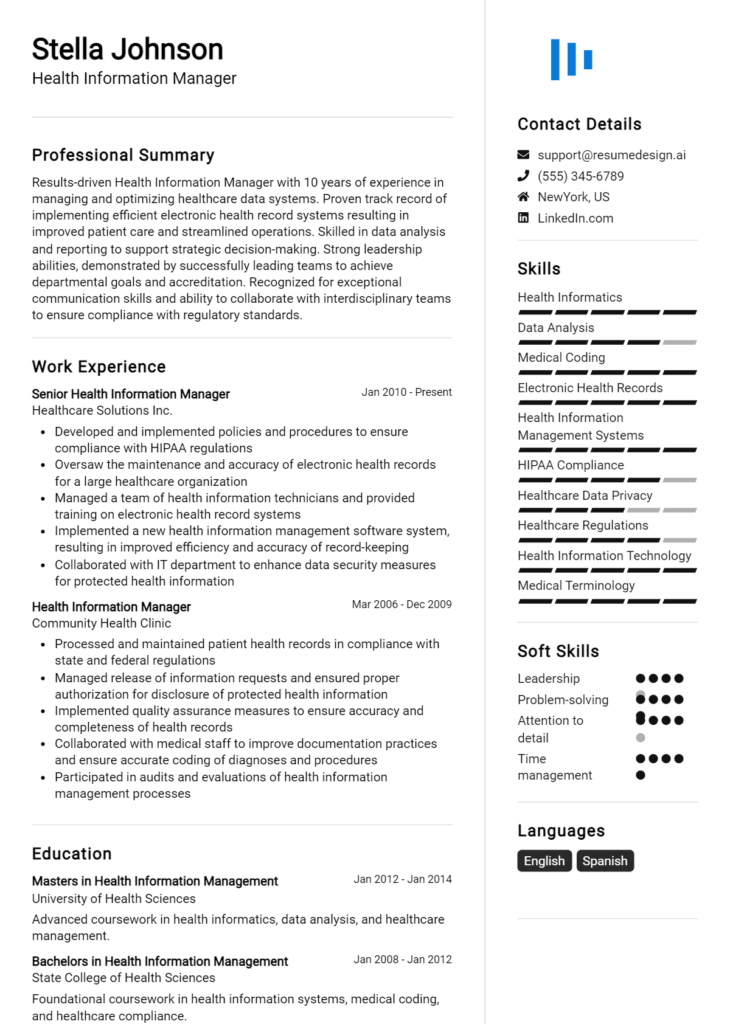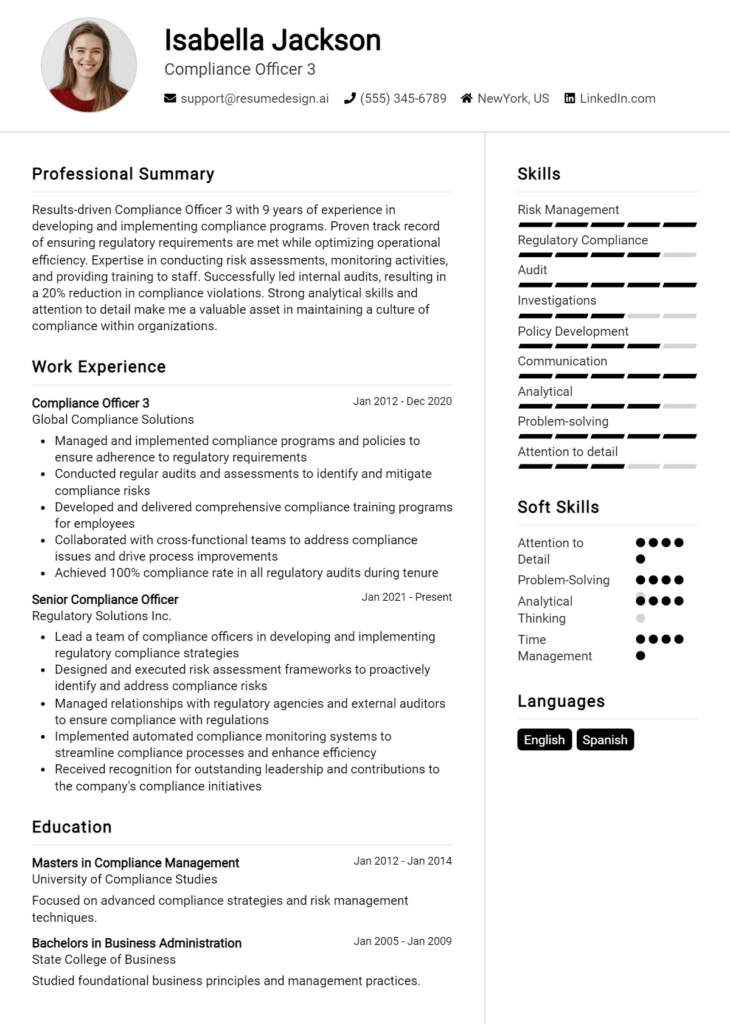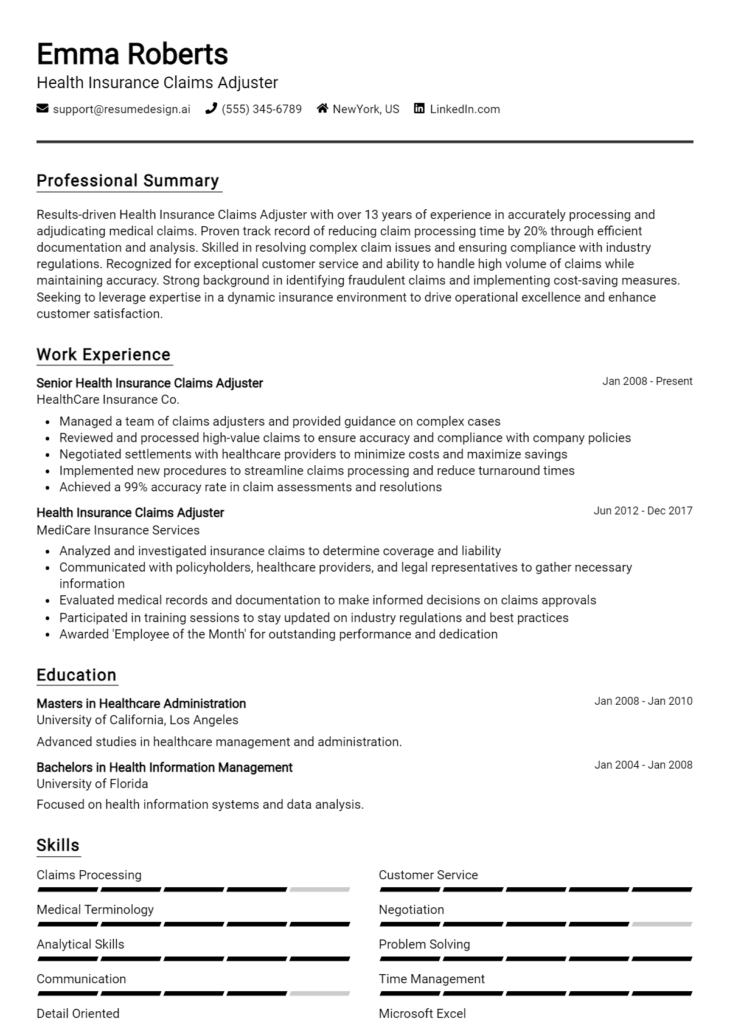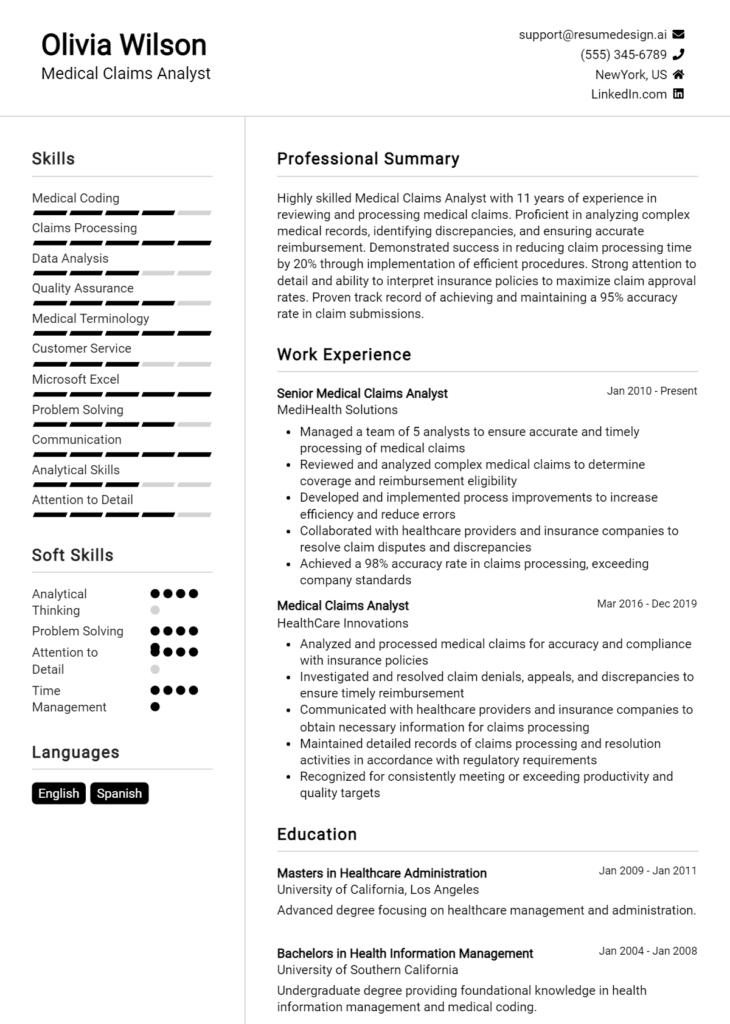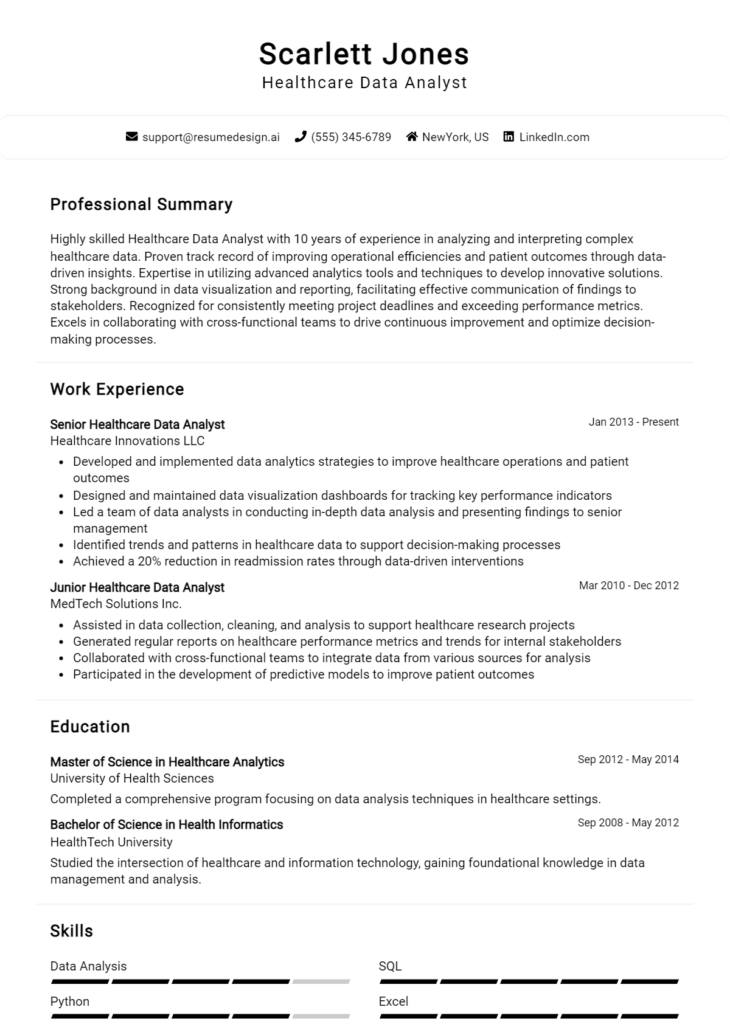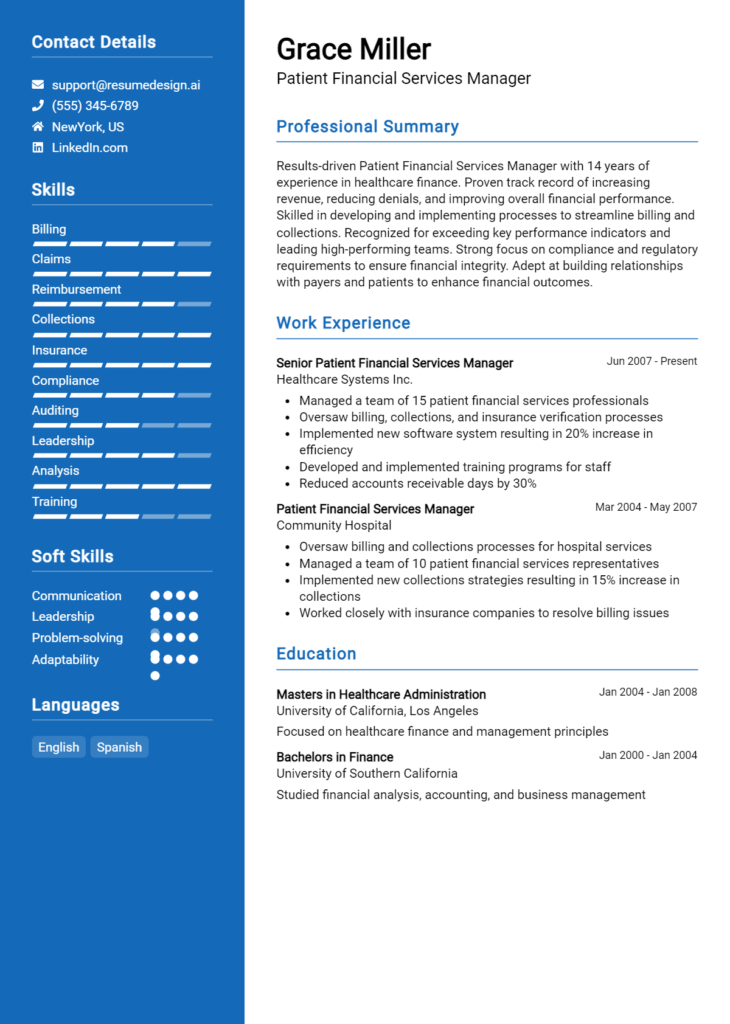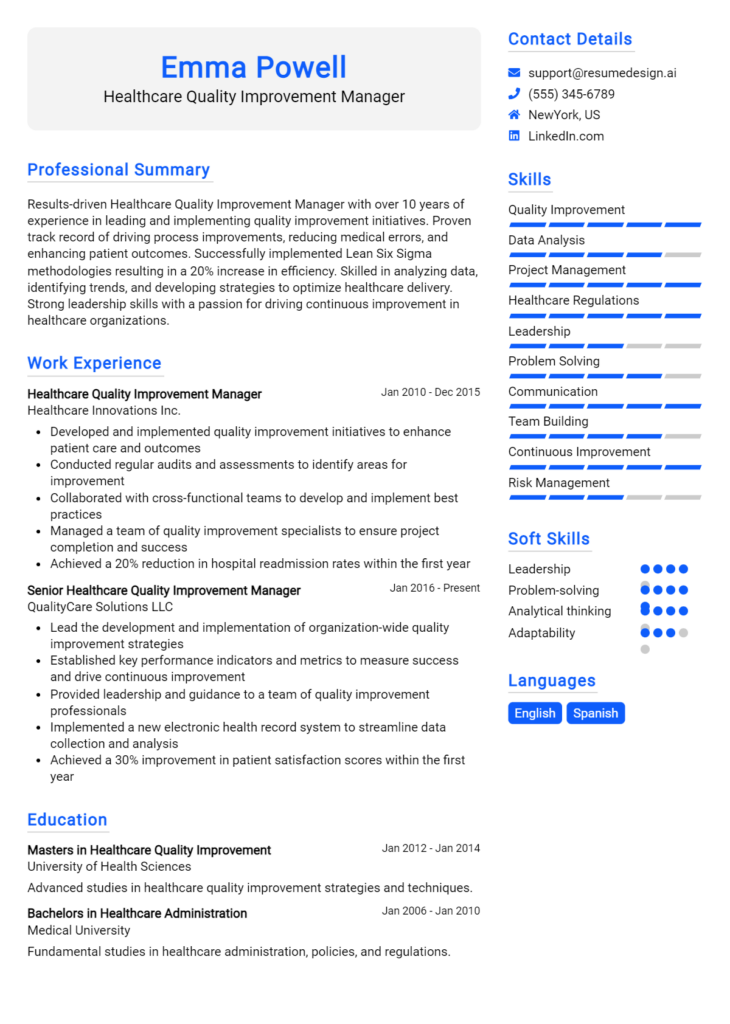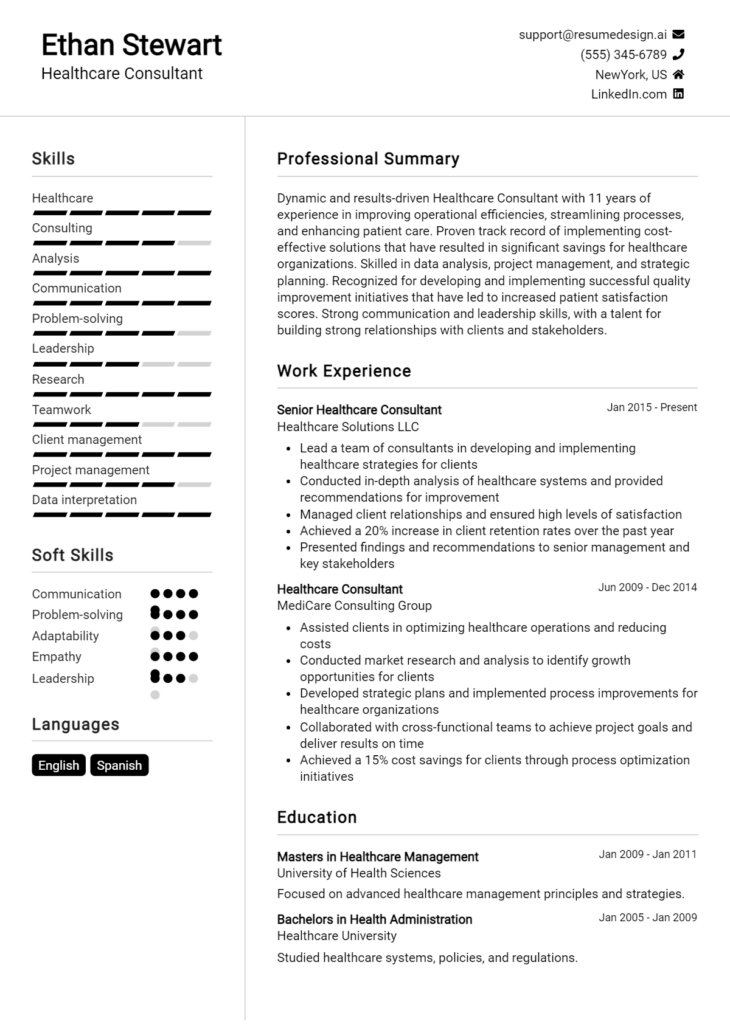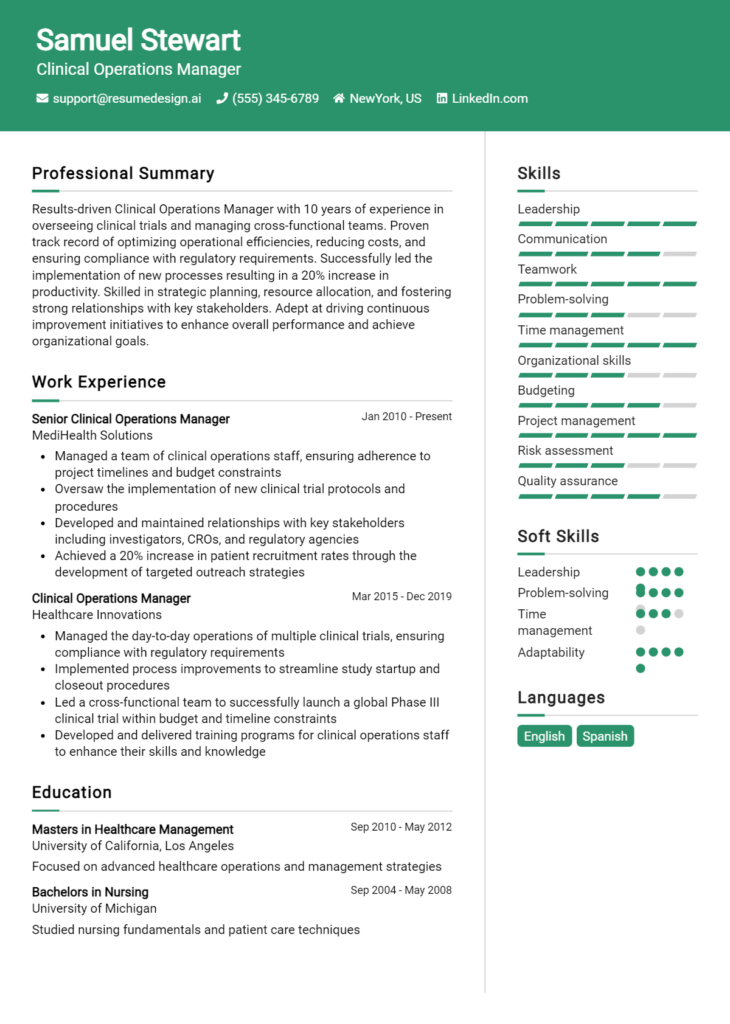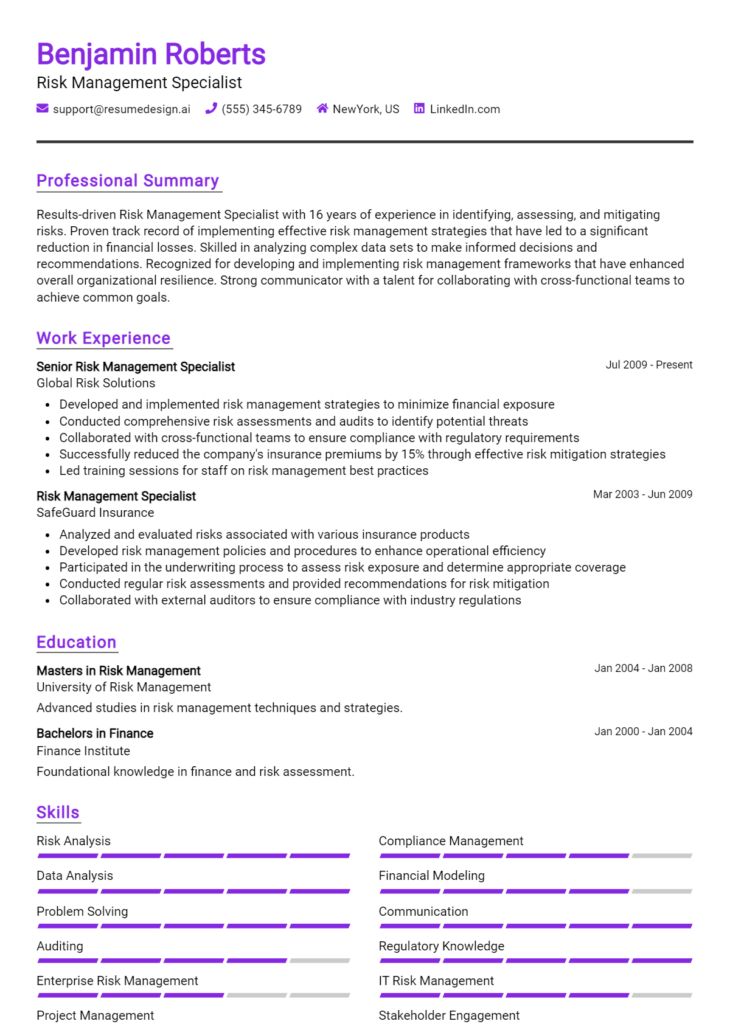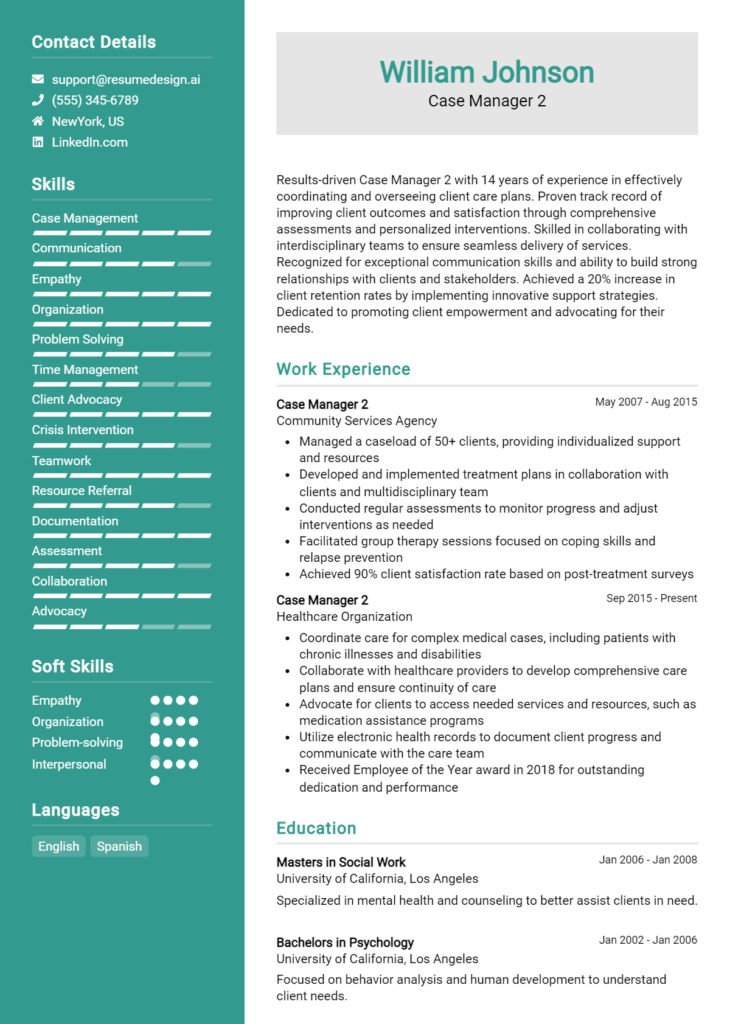Revenue Cycle Manager Core Responsibilities
The Revenue Cycle Manager plays a crucial role in overseeing the financial processes of healthcare organizations, bridging departments such as billing, coding, and patient services. This professional is responsible for optimizing revenue flow, ensuring compliance, and managing collections. Key skills include technical proficiency in healthcare software, strong operational management, and adept problem-solving abilities. These competencies contribute to the organization’s financial health, making a well-structured resume essential for highlighting these qualifications effectively.
Common Responsibilities Listed on Revenue Cycle Manager Resume
- Oversee the entire revenue cycle process from patient registration to final payment.
- Implement strategies to reduce accounts receivable days and improve cash flow.
- Analyze financial data to identify trends and areas for improvement.
- Ensure compliance with healthcare regulations and billing standards.
- Collaborate with clinical and administrative teams to streamline operations.
- Develop training programs for staff on billing and coding practices.
- Manage denial management processes to minimize revenue loss.
- Conduct regular audits to ensure accuracy in billing and coding.
- Utilize data analytics to forecast revenue and assess financial performance.
- Facilitate communication between departments to enhance patient experience.
- Prepare reports for senior management on revenue cycle performance.
- Oversee the implementation of new technology and systems to optimize revenue cycle processes.
High-Level Resume Tips for Revenue Cycle Manager Professionals
A well-crafted resume is essential for Revenue Cycle Manager professionals, as it serves as the first impression a candidate makes on potential employers. In a competitive job market, your resume must not only showcase your skills but also highlight your achievements and demonstrate your value to prospective organizations. An effective resume can open doors to interviews and ultimately lead to your next opportunity. This guide will provide practical and actionable resume tips specifically tailored for Revenue Cycle Manager professionals, ensuring that your application stands out from the crowd.
Top Resume Tips for Revenue Cycle Manager Professionals
- Tailor your resume to the job description by incorporating relevant keywords and phrases that match the requirements.
- Showcase your experience in revenue cycle management by detailing specific roles and responsibilities held in previous positions.
- Quantify your achievements with metrics, such as improved collection rates, reduced days in accounts receivable, or increased revenue generation.
- Highlight industry-specific skills, such as proficiency in medical billing software, compliance regulations, and financial reporting.
- Include certifications and professional development courses related to revenue cycle management, such as Certified Revenue Cycle Professional (CRCP).
- Focus on results-driven language that emphasizes your contributions to previous employers and the impact of your work.
- Utilize a clean, professional format that enhances readability and draws attention to key sections of your resume.
- Include a summary statement at the top of your resume that encapsulates your experience, skills, and career goals related to revenue cycle management.
- Incorporate any relevant technology experience, such as familiarity with electronic health record (EHR) systems or advanced Excel skills.
- Proofread your resume meticulously to eliminate any errors or inconsistencies that could detract from your professionalism.
By implementing these tips, you can significantly enhance your chances of landing a job in the Revenue Cycle Manager field. A focused and polished resume not only showcases your qualifications but also demonstrates your commitment to excellence in revenue cycle management, making you a more attractive candidate to potential employers.
Why Resume Headlines & Titles are Important for Revenue Cycle Manager
In the competitive field of healthcare finance, a Revenue Cycle Manager plays a critical role in ensuring the financial health of an organization. As hiring managers sift through numerous applications, a well-crafted resume headline or title can serve as a powerful first impression. A strong headline immediately captures attention, effectively summarizing a candidate's key qualifications in a single, impactful phrase. It should be concise, relevant, and tailored to the specific position being applied for, allowing hiring managers to quickly gauge the applicant's suitability for the role.
Best Practices for Crafting Resume Headlines for Revenue Cycle Manager
- Keep it concise: Aim for one to two impactful sentences that clearly state your qualifications.
- Be role-specific: Use terminology and keywords relevant to the Revenue Cycle Manager position.
- Highlight key accomplishments: Incorporate measurable achievements or certifications that set you apart.
- Use action-oriented language: Start with strong action verbs to convey confidence and proactivity.
- Avoid jargon: Ensure clarity by avoiding overly technical language that may confuse the reader.
- Tailor for each application: Customize your headline for each job to reflect the specific requirements and responsibilities.
- Showcase your value proposition: Clearly articulate what you bring to the table for the potential employer.
- Maintain professionalism: Choose a tone that reflects the seriousness of the industry while still showcasing your personality.
Example Resume Headlines for Revenue Cycle Manager
Strong Resume Headlines
Dynamic Revenue Cycle Manager with 10+ Years of Experience in Maximizing Collections and Reducing Denials
Results-Driven Revenue Cycle Expert: Proven Track Record of Streamlining Processes and Enhancing Financial Performance
Certified Revenue Cycle Manager Specializing in Compliance and Efficiency Improvements
Strategic Revenue Cycle Leader with Expertise in Revenue Cycle Optimization and Team Development
Weak Resume Headlines
Manager Looking for Opportunities
Experienced Professional in Healthcare
The strong headlines are effective because they immediately convey specific skills, years of experience, and a proven track record of success, making it easy for hiring managers to see the candidate's fit for the role. In contrast, the weak headlines lack specificity and fail to highlight any unique qualifications or achievements, leaving hiring managers with little reason to consider the application further. By crafting a compelling and targeted headline, candidates can significantly enhance their chances of standing out in the job market.
Writing an Exceptional Revenue Cycle Manager Resume Summary
Crafting an exceptional resume summary for a Revenue Cycle Manager is crucial, as it serves as the first impression a candidate makes on hiring managers. A well-written summary quickly captures attention by highlighting key skills, relevant experience, and impressive accomplishments that align with the job role. It should be concise and impactful, providing a snapshot of what the candidate brings to the table while being tailored to the specific position being applied for. A strong summary can set the tone for the rest of the resume and significantly enhance a candidate's chances of landing an interview.
Best Practices for Writing a Revenue Cycle Manager Resume Summary
- Quantify Achievements: Use numbers and metrics to demonstrate your impact on revenue growth and operational efficiency.
- Focus on Relevant Skills: Highlight specific skills that are pertinent to the Revenue Cycle Manager role, such as billing, coding, and compliance.
- Tailor for the Job Description: Customize your summary to reflect the qualifications and requirements outlined in the job posting.
- Be Concise: Limit your summary to 2-4 sentences, ensuring that every word adds value.
- Use Action Verbs: Start with strong verbs to convey leadership and initiative, such as "led," "optimized," or "improved."
- Showcase Leadership Experience: Mention any roles that demonstrate your capability to lead teams and manage complex projects.
- Incorporate Industry Terminology: Use terminology familiar to the healthcare industry to resonate with hiring managers.
- Highlight Problem-Solving Skills: Emphasize your ability to address challenges within the revenue cycle effectively.
Example Revenue Cycle Manager Resume Summaries
Strong Resume Summaries
Dynamic Revenue Cycle Manager with over 10 years of experience optimizing billing processes, resulting in a 30% reduction in claim denials and a 25% increase in revenue capture. Proven track record of leading cross-functional teams to enhance operational efficiency and comply with regulatory standards.
Results-oriented professional with expertise in revenue cycle management, achieving a 40% decrease in days in accounts receivable through process improvements and training initiatives. Skilled in data analysis and reporting, with a focus on enhancing patient satisfaction and operational workflow.
Strategic Revenue Cycle Manager with a strong background in healthcare finance, successfully implementing new coding procedures that led to a 15% boost in reimbursement rates. Adept at identifying revenue leakage and developing effective solutions to improve financial performance.
Weak Resume Summaries
Experienced manager looking for a position in revenue cycle management. I have worked in healthcare for several years and understand billing and coding.
Revenue Cycle Manager with knowledge of various processes. I am a team player and can help improve operations.
The examples of strong resume summaries are considered effective because they provide specific, quantifiable results, demonstrate relevant skills, and align closely with the responsibilities of a Revenue Cycle Manager. In contrast, the weak summaries lack detail, fail to showcase measurable achievements, and come across as generic, making it difficult for hiring managers to gauge the candidate's qualifications. A strong summary effectively conveys the candidate's value proposition, while a weak summary does not capture the necessary attention or interest.
Work Experience Section for Revenue Cycle Manager Resume
The work experience section of a Revenue Cycle Manager resume is critical as it serves as a platform to demonstrate the candidate's technical skills, leadership abilities, and commitment to delivering high-quality outcomes in revenue cycle management. This section not only highlights the candidate's proficiency with industry-standard practices and technologies but also illustrates their capacity to effectively manage teams and drive operational efficiency. Quantifying achievements—such as increases in revenue, reductions in billing errors, or improvements in processing times—further strengthens this section, making it essential to align the presented experience with the expectations of the healthcare industry.
Best Practices for Revenue Cycle Manager Work Experience
- Emphasize technical expertise in billing software, coding, and regulatory compliance.
- Quantify achievements with specific metrics such as percentage improvements or cost savings.
- Showcase leadership experience by detailing team management and training initiatives.
- Highlight collaborative projects that demonstrate effective communication with other departments.
- Focus on results-oriented statements that reflect direct impact on revenue cycle performance.
- Use industry-specific terminology to align with current standards and practices.
- Include relevant certifications or ongoing professional development to showcase commitment to the field.
- Tailor experiences to match the job description and requirements of the position you are applying for.
Example Work Experiences for Revenue Cycle Manager
Strong Experiences
- Led a team of 15 billing specialists to streamline the claims processing workflow, resulting in a 30% reduction in billing errors and a 20% increase in on-time payments over a one-year period.
- Implemented a new revenue cycle management software that improved data accuracy, contributing to a 25% decrease in claims denials and saving the organization $150,000 annually.
- Collaborated with clinical teams to enhance documentation practices, leading to a 15% increase in reimbursement rates for high-value procedures within six months.
- Trained and developed staff on coding updates and compliance regulations, achieving a 100% passing rate on audits over two consecutive years.
Weak Experiences
- Responsible for billing tasks and ensured claims were processed.
- Worked with other departments to address issues in revenue cycle.
- Participated in training sessions for new software.
- Assisted in various projects related to revenue management.
The strong experiences are considered effective because they provide specific, quantifiable outcomes that demonstrate the candidate's impact and leadership in the revenue cycle process. Each bullet point highlights significant achievements that align with industry standards and showcases the candidate's ability to enhance operational efficiency and revenue outcomes. Conversely, the weak experiences lack specific details and measurable results, making them less compelling and failing to convey the candidate's true contributions to their previous roles.
Education and Certifications Section for Revenue Cycle Manager Resume
The education and certifications section of a Revenue Cycle Manager resume is essential for showcasing a candidate's academic foundation and professional qualifications. This segment not only illustrates a commitment to the field through relevant educational achievements but also highlights any industry-recognized certifications that demonstrate expertise and competency. By detailing pertinent coursework, specialized training, and continuing education efforts, candidates can enhance their credibility and better align themselves with the demands of the role. A well-structured education and certifications section can significantly influence hiring managers by providing them with a clear picture of the candidate's preparedness for the challenges of revenue cycle management.
Best Practices for Revenue Cycle Manager Education and Certifications
- Include only relevant degrees and certifications that directly relate to revenue cycle management.
- List your highest degree first, followed by any additional relevant degrees or certifications.
- Provide specific details about coursework that pertains to healthcare finance, billing, coding, and compliance.
- Highlight any industry-recognized certifications, such as Certified Revenue Cycle Executive (CRCE) or Certified Healthcare Financial Professional (CHFP).
- Incorporate continuing education credits or workshops that demonstrate your commitment to staying current in the field.
- Use clear formatting to make this section easy to read and visually appealing, ensuring key information stands out.
- Consider including professional affiliations or memberships that reinforce your expertise and dedication to the industry.
- Regularly update this section to reflect any new qualifications or relevant educational experiences.
Example Education and Certifications for Revenue Cycle Manager
Strong Examples
- M.S. in Healthcare Administration, University of Health Sciences, 2021
- Certified Revenue Cycle Executive (CRCE), Healthcare Financial Management Association, 2022
- B.S. in Business Administration with a concentration in Finance, State University, 2019
- Completed Advanced Medical Coding and Billing Training, 2020
Weak Examples
- Bachelor of Arts in English Literature, University of Arts, 2010
- Basic First Aid Certification, 2015
- High School Diploma, 2008
- Outdated certification in Medical Billing from a non-accredited institution, 2017
The examples provided are considered strong because they reflect relevant degrees, recognized certifications, and specialized training directly applicable to the role of a Revenue Cycle Manager. These qualifications demonstrate a candidate's preparedness and commitment to the field. Conversely, the weak examples are deemed irrelevant as they include outdated or unrelated educational backgrounds and certifications that do not align with the expectations of a revenue cycle management position, thereby diminishing the candidate's appeal to potential employers.
Top Skills & Keywords for Revenue Cycle Manager Resume
As a Revenue Cycle Manager, possessing the right skills is critical for driving efficiency and effectiveness in managing the financial processes of healthcare organizations. A well-crafted resume that highlights both hard and soft skills can significantly differentiate candidates in a competitive job market. Employers seek professionals who can not only navigate complex billing systems and ensure compliance with regulations but also exhibit strong leadership and communication capabilities. By emphasizing these essential skills, candidates can demonstrate their readiness to optimize revenue cycles and contribute to the overall financial health of their organization.
Top Hard & Soft Skills for Revenue Cycle Manager
Soft Skills
- Leadership
- Communication
- Problem-Solving
- Analytical Thinking
- Team Collaboration
- Time Management
- Adaptability
- Conflict Resolution
- Attention to Detail
- Customer Service Orientation
- Emotional Intelligence
- Negotiation Skills
- Critical Thinking
- Decision-Making
Hard Skills
- Medical Coding and Billing
- Revenue Cycle Management Software Proficiency
- Financial Analysis
- Regulatory Compliance Knowledge
- Data Analysis and Reporting
- Claims Management
- Accounts Receivable Management
- Insurance Verification
- Process Improvement Techniques
- Budgeting and Forecasting
- Healthcare Financial Management
- Electronic Health Record (EHR) Systems
- Denial Management
- Risk Management
- Project Management
For more insights on how to effectively showcase your skills and work experience, consider crafting a resume that aligns with the expectations of hiring managers in the healthcare industry.
Stand Out with a Winning Revenue Cycle Manager Cover Letter
Dear Hiring Manager,
I am writing to express my interest in the Revenue Cycle Manager position at [Company Name], as advertised on [where you found the job listing]. With over [number] years of experience in healthcare finance and revenue cycle management, I have honed my skills in optimizing processes, improving collection rates, and ensuring compliance with regulatory standards. I am excited about the opportunity to contribute to your team and help streamline operations to maximize revenue while enhancing patient satisfaction.
In my previous role at [Previous Company Name], I successfully led a team of [number] in implementing new billing software that reduced claim denials by [percentage]% and improved overall cash flow. I have a proven track record of analyzing revenue cycle metrics and developing strategic initiatives that have resulted in significant financial improvements. My ability to collaborate cross-functionally with clinical and administrative staff has been pivotal in identifying areas for process enhancement, ensuring that we meet and exceed financial targets.
Furthermore, my commitment to continuous improvement and staff training has fostered a culture of accountability and excellence within my teams. I am adept at using data analytics to drive decision-making and have a strong understanding of payer contracts and reimbursement models, which I believe are crucial for a successful revenue cycle. I am eager to bring my expertise and passion for healthcare finance to [Company Name] and contribute to your mission of delivering exceptional patient care while optimizing revenue.
Thank you for considering my application. I look forward to the opportunity to discuss how my background and skills align with the goals of [Company Name]. I am confident that my experience and dedication will make a positive impact on your revenue cycle operations.
Sincerely,
[Your Name]
[Your Phone Number]
[Your Email Address]
Common Mistakes to Avoid in a Revenue Cycle Manager Resume
When crafting a resume for the role of a Revenue Cycle Manager, it is essential to present a comprehensive and compelling document that highlights relevant skills and experiences. However, many candidates make common mistakes that can detract from their qualifications and diminish their chances of landing an interview. Understanding these pitfalls can help applicants refine their resumes and make a lasting impression on hiring managers.
Vague Job Descriptions: Using generic job titles and descriptions can fail to convey specific responsibilities and achievements. Be sure to detail your role and contributions in previous positions.
Neglecting Quantifiable Achievements: Omitting measurable outcomes, such as percentages of revenue improvement or reductions in billing errors, can make your accomplishments seem less impactful. Always include data that supports your successes.
Overloading with Jargon: While industry-specific terms are important, excessive jargon can confuse readers. Aim for clarity and ensure that your resume is accessible to HR professionals who may not have a technical background.
Ignoring Keywords: Not incorporating relevant keywords from the job description can lead to your resume being overlooked by applicant tracking systems (ATS). Tailor your resume to each job application to improve visibility.
Lack of Tailoring for Each Application: Submitting a one-size-fits-all resume can signal to employers that you’re not genuinely interested in their specific role. Customizing your resume for each application demonstrates commitment and attention to detail.
Poor Formatting: A cluttered or overly complex layout can make it difficult for hiring managers to read your resume quickly. Use clear headings, bullet points, and consistent formatting to enhance readability.
Omitting Soft Skills: Focusing solely on technical skills can overlook the importance of soft skills such as communication, leadership, and problem-solving. Highlighting these traits is crucial for a managerial role.
Failure to Update Information: Not keeping your resume current can result in missed opportunities. Regularly update your resume with new skills, certifications, and accomplishments to remain competitive in the job market.
Conclusion
As we conclude our exploration of the Revenue Cycle Manager role, it's essential to reflect on the key responsibilities and skills that define this position. A successful Revenue Cycle Manager not only oversees the financial aspects of patient care but also ensures that billing processes are efficient, compliant, and optimized for revenue generation. This role demands a blend of analytical skills, attention to detail, and a deep understanding of healthcare regulations and billing practices.
Additionally, strong leadership and communication skills are vital as the Revenue Cycle Manager collaborates with various departments to enhance the overall financial health of the organization. Continuous improvement and staying up-to-date with industry trends are also critical for success in this dynamic field.
Now is the perfect time to review your resume and ensure it highlights your qualifications and experiences relevant to the Revenue Cycle Manager position. Take advantage of the available resources to enhance your application. Explore resume templates for a polished look, utilize the resume builder for an easy-to-use format, and check out resume examples to get inspired. Don’t forget to craft a compelling introduction with our cover letter templates. Equip yourself with the right tools to stand out in your job search and secure that desired position!

